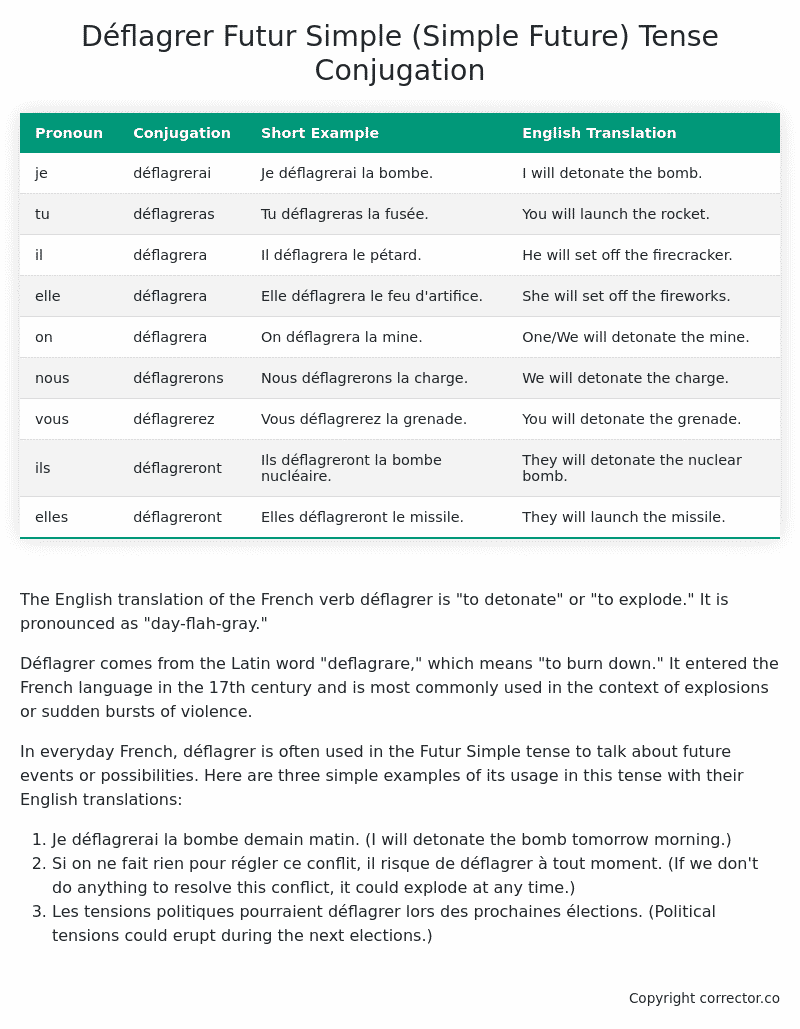Futur Simple (Simple Future) Tense Conjugation of the French Verb déflagrer
Introduction to the verb déflagrer
The English translation of the French verb déflagrer is “to detonate” or “to explode.” It is pronounced as “day-flah-gray.”
Déflagrer comes from the Latin word “deflagrare,” which means “to burn down.” It entered the French language in the 17th century and is most commonly used in the context of explosions or sudden bursts of violence.
In everyday French, déflagrer is often used in the Futur Simple tense to talk about future events or possibilities. Here are three simple examples of its usage in this tense with their English translations:
- Je déflagrerai la bombe demain matin. (I will detonate the bomb tomorrow morning.)
- Si on ne fait rien pour régler ce conflit, il risque de déflagrer à tout moment. (If we don’t do anything to resolve this conflict, it could explode at any time.)
- Les tensions politiques pourraient déflagrer lors des prochaines élections. (Political tensions could erupt during the next elections.)
Table of the Futur Simple (Simple Future) Tense Conjugation of déflagrer
| Pronoun | Conjugation | Short Example | English Translation |
|---|---|---|---|
| je | déflagrerai | Je déflagrerai la bombe. | I will detonate the bomb. |
| tu | déflagreras | Tu déflagreras la fusée. | You will launch the rocket. |
| il | déflagrera | Il déflagrera le pétard. | He will set off the firecracker. |
| elle | déflagrera | Elle déflagrera le feu d’artifice. | She will set off the fireworks. |
| on | déflagrera | On déflagrera la mine. | One/We will detonate the mine. |
| nous | déflagrerons | Nous déflagrerons la charge. | We will detonate the charge. |
| vous | déflagrerez | Vous déflagrerez la grenade. | You will detonate the grenade. |
| ils | déflagreront | Ils déflagreront la bombe nucléaire. | They will detonate the nuclear bomb. |
| elles | déflagreront | Elles déflagreront le missile. | They will launch the missile. |
Other Conjugations for Déflagrer.
Le Present (Present Tense) Conjugation of the French Verb déflagrer
Imparfait (Imperfect) Tense Conjugation of the French Verb déflagrer
Passé Simple (Simple Past) Tense Conjugation of the French Verb déflagrer
Passé Composé (Present Perfect) Tense Conjugation of the French Verb déflagrer
Futur Simple (Simple Future) Tense Conjugation of the French Verb déflagrer (this article)
Futur Proche (Near Future) Tense Conjugation of the French Verb déflagrer
Plus-que-parfait (Pluperfect) Tense Conjugation of the French Verb déflagrer
Passé Antérieur (Past Anterior) Tense Conjugation of the French Verb déflagrer
Futur Antérieur (Future Anterior) Tense Conjugation of the French Verb déflagrer
Subjonctif Présent (Subjunctive Present) Tense Conjugation of the French Verb déflagrer
Subjonctif Passé (Subjunctive Past) Tense Conjugation of the French Verb déflagrer
Subjonctif Imparfait (Subjunctive Imperfect) Tense Conjugation of the French Verb déflagrer
Subjonctif Plus-que-parfait (Subjunctive Pluperfect) Tense Conjugation of the French Verb déflagrer
Conditionnel Présent (Conditional Present) Tense Conjugation of the French Verb déflagrer
Conditionnel Passé (Conditional Past) Tense Conjugation of the French Verb déflagrer
L’impératif Présent (Imperative Present) Tense Conjugation of the French Verb déflagrer
L’infinitif Présent (Infinitive Present) Tense Conjugation of the French Verb déflagrer
Struggling with French verbs or the language in general? Why not use our free French Grammar Checker – no registration required!
Get a FREE Download Study Sheet of this Conjugation 🔥
Simply right click the image below, click “save image” and get your free reference for the déflagrer Futur Simple tense conjugation!

Déflagrer – About the French Futur Simple (Simple Future) Tense
Formation of Futur Simple
For regular -er verbs (e.g., parler – to speak)
For regular -ir verbs (e.g., finir – to finish)
For regular -re verbs (e.g., vendre – to sell)
Common Everyday Usage Patterns
Conditional Statements
Interactions with Other Tenses
Futur Antérieur
Conditional
Present
Summary
I hope you enjoyed this article on the verb déflagrer. Still in a learning mood? Check out another TOTALLY random French verb conjugation!


